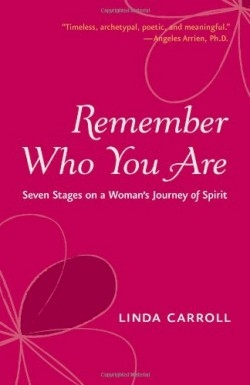Remember Who You Are
Seven Stages on a Woman's Journey of Spirit
In her latest book, Remember Who You Are, Linda Carroll offers an astonishingly diverse array of thoughts. From Coretta Scott King to Sappho, the pages of Remember are enriched with a wealth of meditations from great women thinkers, sprinkled between the poetry and prose of the author. Remember serves as a guide to reconnecting with a spiritual dimension within oneself, an essence that Carroll argues is shared among women. A gifted poet, Carroll acknowledges the power behind words. She uses the writings of Virginia Woolf and Alice Walker to reaffirm this shared essence and the power of womanhood. Although Remember is not a feminist manifesto, Carroll truly believes in reinforcing the beauty of the feminine, and there is poetry in that.
Carroll traces the journey of remembering through seven stages that she argues are interchangeable and overlapping. Forgetting is one of the pivotal stages, something that Carroll argues happens at birth when we first enter the physical world. Now if this sounds vaguely reminiscent of a religious doctrine, the author is more than aware of it. She argues that “Remembering is the key to most world religions and to spiritual experience….In whatever way we are awakened, we are reminded for a moment of a different realm of existence with its own truth.” Clearly, Remember is a spiritual guide; however it shies away from the rigid boundaries of religious doctrine. Instead of listing rules and regulations, Carroll offers a more celebra-tory take on rediscovering spirituality, the results of which are much more empowering for the reader.
Ultimately, what separates Carroll’s tale of spiritual awakening from so many other self-help/spirituality books is her emphasis on what we al-ready have, not what we are lacking. Although she names moments when we may feel a spiritual void, Carroll is careful to focus her stories on celebrating and rediscovering an essence that she argues is inside of us, waiting to be rediscovered. Her narrative accounts for the alienation that women may ex-perience in our society, and connects that to a larger spiritual amputation that occurs at an early stage in life. Carroll’s philosophy goes farther than simply saying that the problems do not exist within us, but instead that the answers do. Such an affirmation celebrates the beauty of womanhood in a society that often punishes it.
Disclosure: This article is not an endorsement, but a review. The publisher of this book provided free copies of the book to have their book reviewed by a professional reviewer. No fee was paid by the publisher for this review. Foreword Reviews only recommends books that we love. Foreword Magazine, Inc. is disclosing this in accordance with the Federal Trade Commission’s 16 CFR, Part 255.

